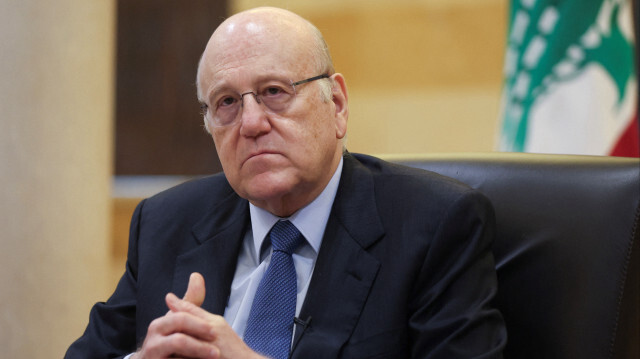
Najib Mikati reaffirms Lebanon's commitment to implementation of UN Security Council Resolution 1701, which calls for complete cessation of hostilities between Lebanon, Israel
Lebanon's main priority is to achieve a cease-fire and end Israeli aggression while ensuring the security and safety of its citizens, the country's prime minister said on Saturday.
Najip Mikati made these remarks during a meeting with Iranian Parliament Speaker Mohammad Bagher Ghalibaf, who arrived in Beirut for a one-day visit, according to a statement from the prime minister's office.
During the talks, the premier reaffirmed Lebanon's commitment to fully implementing UN Security Council Resolution 1701 and strengthening the Lebanese army's presence in southern Lebanon.
He emphasized ongoing efforts with key international players and the United Nations to pressure Israel into complying with the resolution.
“Our government's priorities at this stage are to work for a cease-fire, halt Israeli aggression, and protect Lebanon's security and the safety of its citizens,” Mikati reiterated.
In a related development, Mikati received a phone call from US envoy Amos Hochstein, during which they discussed efforts to secure a cease-fire and halt military confrontations with Israel.
They also explored the possibility of a comprehensive political solution based on the UN resolution.
On Friday, after a Cabinet meeting, Mikati noted that "Hezbollah is a partner in Lebanon's government and agrees to the implementation of Resolution 1701."
The prime minister also confirmed that Lebanon's Foreign Ministry had submitted a request to the UN Security Council for an immediate cease-fire and the full enforcement of the resolution.
Adopted on Aug. 11, 2006, the resolution calls for a complete cessation of hostilities between Lebanon and Israel and the establishment of a demilitarized zone between the Blue Line (the boundary between Lebanon and Israel) and the Litani River, allowing only the Lebanese army and the UN Interim Force in Lebanon (UNIFIL) to possess weapons and military equipment in the area.
Israel has mounted massive airstrikes across Lebanon against what it claims are Hezbollah targets since Sept. 23, killing at least 1,411 people, injuring over 3,970 others, and displacing more than 1.34 million people.
The aerial campaign is an escalation from a year of cross-border warfare between Israel and Hezbollah since the start of its offensive on the Gaza Strip, in which Israel has killed nearly 42,200 people, most of them women and children, since a Hamas attack last year.
Despite international warnings that the Mideast was on the brink of a regional war amid Israel's relentless attacks on Gaza and Lebanon, it expanded the conflict on Oct. 1 by launching a ground incursion into southern Lebanon.

